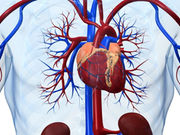Carvedilol does not prevent reduction in LVEF in breast cancer but is linked to lower troponin I levels
MONDAY, March 12, 2018 (HealthDay News) — For women with human epidermal growth factor receptor type 2 (HER2)-negative breast cancer receiving anthracycline (ANT) chemotherapy, carvedilol does not prevent cardiotoxicity, according to a study published online March 11 in the Journal of the American College of Cardiology. The research was published to coincide with the annual meeting of the American College of Cardiology, held from March 10 to 12 in Orlando, Fla.
Monica Samuel Avila, M.D., from the Hospital das Clínicas da Faculdade de Medicina da Universidade de São Paulo in Brazil, and colleagues examined the role of carvedilol in preventing ANT cardiotoxicity in patients with HER2-negative breast cancer tumor status and normal left ventricular ejection fraction (LVEF). Two hundred patients referred for ANT were randomized to receive carvedilol or placebo until completion of chemotherapy.
The researchers found that the primary end point of prevention of a ≥10 percent reduction in LVEF at six months occurred in 14.5 and 13.5 percent of patients in the carvedilol and placebo groups, respectively (P = 1.0). There were no differences between the groups in changes of LVEF or brain natriuretic peptide. Troponin I levels differed significantly between the groups over time, with the carvedilol group having lower levels (P = 0.003). The carvedilol group also had a significantly lower incidence of diastolic dysfunction (P = 0.039).
“In this scenario, carvedilol had no impact on the incidence of early onset of LVEF reduction,” the authors write.
Baldacci Laboratories donated the carvedilol and placebo used in this study.
Copyright © 2018 HealthDay. All rights reserved.








